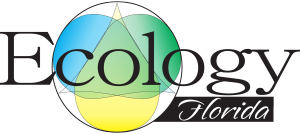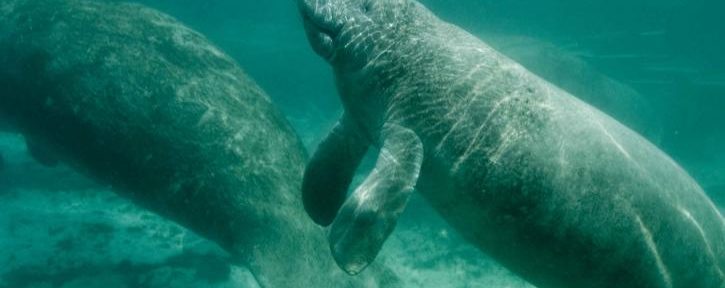by Monica Starr
February 2022
Along the Atlantic coast, Florida manatee mortalities continue to increase and organizations like the Florida Fish and Wildlife Conservation Commission (FWC) and the U.S. Fish and Wildlife Service are currently investigating why. Similarly, various environmental conditions in the Indian River Lagoon are also of concern. It is extremely important to help these manatees that impact both Florida’s local ecology and economy. These sea cows require large amounts of vegetation and a healthy coastal habitat in order to thrive.
Since these manatees live in areas like Florida’s springs and coastal regions around the state, their diet consists of over 100 pounds of underwater vegetation per day. Due to environmental issues in these areas, the lack of seagrasses results in these manatees dying of starvation. The vegetation is dying off for various reasons, especially in the Indian River Lagoon. The poor water quality and colder temperatures in this area results in harmful algal blooms which kills off these seagrass beds that are essential for the diet of these aquatic herbivores. Poor water quality is due to a variety of pollutants like nitrogen and phosphorus which can enter the water via fertilizers and human waste. A similar situation happened this past summer during the Red-tide event here in Florida.
Recent colder water temperatures in the state are the result of climate change, which directly impacts countless marine species. Florida Fish and Wildlife released a report in January explaining that manatees have died and are still dying at record rates. This report explains that ironically sea cows do not have a lot of body fat to help them stay warm and that they are actually susceptible to conditions like hypothermia. This report also explains that in general, the water temperatures are not a huge concern, but sudden cold snaps can result in large groups of manatees dying. The four major threats to manatees according to Time Martell from Florida and Fish Wildlife are cold water events, water quality, habitat loss and boaters.
Wildlife organizations like the Manatee Rehabilitation partnership work extremely hard to respond to manatees in need of rescue or assistance. Similarly, the FWC has manatee biologists which are also taking on response calls and public reports. The FWC explains that this agency takes manatee conservation very seriously and they work to implement science-based conservation measures. If you see a sick, injured, dead or tagged manatee, the FWC has a wildlife alert number (1-888-404-3922).
Another ongoing project by the Florida Fish and Wildlife Conservation Commission is an agency-run feeding area in the Indian River Lagoon. In the Indian River Lagoon specifically, it has been estimated by researchers that almost 90% of the seagrass in this area has died off. These feeding areas are a way to get the organization involved while making sure that the manatees do not die of starvation. Please remember that this feeding area required proper permitting and without it, feeding manatees is against the law. As the temperatures continue to fluctuate, restoration and rescue projects will be very important. These wildlife organizations are crucial to address these problems with our Florida manatees. Ecology Florida will continue to follow research efforts like this moving forward.
Monica Starr is the Public Communications Facilitator for Ecology Florida News. Monica is a graduate student at the University of South Florida studying Global Sustainability.
https://www.fox4now.com/news/local-news/colder-weather-could-impact-manatees-as-population-declines
https://myfwc.com/research/manatee/rescue-mortality-response/ume/
https://cbs12.com/news/local/in-rare-move-fwc-to-hand-feed-starving-manatees-in-indian-river-lagoon


Leave a Reply